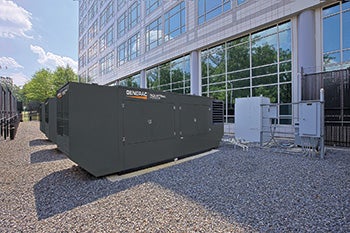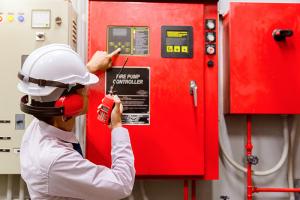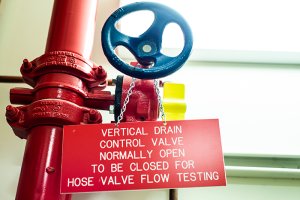Backup power requires correct connectivity for outage protection
 |
| Backup power generation requires circuitry to all essential systems to be most effective in an outage. Photo courtesy of Generac Power Systems |
Even though the vast majority of U.S. hospitals are properly equipped with backup generators in case of a power outage in their area, one in 20 are not fully prepared for such an event, according to a recent survey of health care facility managers.
An outage would result in an estimated loss of $1 million a day in revenue and other costs plus a potentially damaged reputation that could impact future revenue, according to a white paper released by Lawrence Associates LLC, a technology consulting firm in Somerset, N.J.
Value engineering, the addition of more space to a facility and the age of the backup equipment are factors that can impact the correct backup power capacity, according to the report and health care facility experts.
Even though most hospitals have adequate backup power and conduct the required testing and maintenance of equipment, they still may not be ready for an outage for other reasons, says Dan Barbersek, director of industrial sales, Generac Power Systems, Waukesha, Wis.
Unless or until an outage occurs, hospitals likely will not know which equipment or systems other than required life safety will function with just backup power,
he says.
"What we have found is that, during a long outage when a hospital is running on backup generators, things start to get exposed where you don't have the right elevators operating or you don't have the right hallways lit to transport patients in and out," he says.
It's difficult to assess which systems are wired into the backup power supply until an outage occurs, and many hospitals don't do it because it is not required or they have not experienced an outage, he says.
Making the outage readiness determination can be done internally, but it is time-consuming, labor-intensive and cost-prohibitive because of the work involved, he notes.
Instead, Barbersek advises that hospitals hire a health care engineering firm to figure out exactly how well-prepared they are if an outage hits. Otherwise, it's easy for facilities to become complacent simply by having the correct capacity backup power, he warns.
"We're saying you need to take the next step, which goes beyond just keeping a generator at your facility, by addressing circuitry to the generator," he says.
Barbersek also stresses the importance of ensuring fuel delivery for the backup power system in an emergency.
"To get fuel to your facility in an outage, you need to have some kind of plan or contract with a fuel delivery company to make sure you are on their list of customers they must serve. I think many hospitals fail to do that," he says.
[Editor's note: The American Society for Healthcare Engineering is currently conducting an in-depth study of the emergency power issue.]




